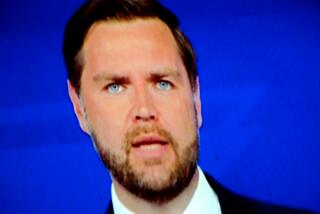NEWS ANALYSIS : Vice President Hopefuls Swing Hard, Connect : Campaign: Debate’s results likely to be minimal. But sparks, specifics show value of more direct engagement.
- Share via
The vice presidential candidates Tuesday night produced a more bruising, bare-knuckled fight over issues than their running mates--but probably left unchanged the basic dynamic of the presidential race.
After an opening presidential debate Sunday night that offered few specifics--and even fewer sparks--Vice President Dan Quayle and Sen. Al Gore of Tennessee managed plenty of both Tuesday. In often-lacerating exchanges, Quayle and Gore did a better job articulating their campaign’s basic messages than President Bush and Arkansas Gov. Bill Clinton did in Sunday’s low-energy affair.
In the cross-fire, retired Vice Adm. James B. Stockdale often seemed lost--a civilian who had wandered into a private war.
The succession of sharp clashes between Quayle and Gore over taxes, trust and character gave this debate a much rougher edge than the decorous first encounter between the presidential contenders. But traditionally, the vice presidential debates have only minimally affected the outcome of presidential campaigns, and analysts said none of Tuesday night’s sound and fury seemed likely to challenge that precedent.
“This ought not to have a major impact on the presidential race,” said Stuart Rothenberg, editor of a Washington political newsletter.
An ABC poll taken immediately after the debate underscored Rothenberg’s contention: It showed Clinton leading Bush, 47% to 38%, with Perot trailing at 12%. Those figures were virtually unchanged from a poll completed before the debate.
If Tuesday’s debate has any impact on the race, some observers said, it may be to diminish the momentum Perot generated Sunday.
Although Stockdale’s earthy directness occasionally echoed Perot’s own success at knifing through his opponents’ stilted political rhetoric, more often he appeared uncertain and overmatched; for long stretches in the free-form debate he disappeared entirely. Stockdale, a senior research fellow at the conservative Hoover Institution in Palo Alto, never seemed to entirely answer the question he posed at the outset: “Why am I here?”
Stockdale stepped onto the stage an unknown; he may have left it an enigma.
If Perot’s folksy--if often vague--performance Sunday was a 90-minute testimonial to the value of an outsiders’ perspective in politics, Stockdale’s more hesitant showing Tuesday may have served as a reminder that electing amateurs carries some risks too. In an NBC news survey immediately after the debate, 56% of those polled said the evening made them less likely to vote for Perot.
“I sat there thinking Stockdale is a perfectly nice person, who I admire for a lot of things he’s done in his life, but who clearly has no business being on this stage--and who clearly would have no business being vice president,” Democratic strategist Mike McCurry said.
Stockdale’s fuzziness contrasted with the sharp profiles cut by Quayle and Gore--both of whom laid out their party’s case against their opponents in terms undiluted by the elaborate politeness that characterized Sunday’s debate.
Gore returned repeatedly to his ticket’s basic argument: that Bush and Quayle had failed on the economy because they have favored the affluent over ordinary Americans. To a greater extent than Clinton, Gore even managed to make the Democratic case against Perot’s economic plan, arguing that its focus on eliminating the deficit in five years would deepen the recession.
Virtually ignoring Stockdale, Quayle was even more relentless in hammering home the two basic messages the Bush campaign has tried, so far with limited success, to sell since the Republican Convention in August: that Bill Clinton will weaken the economy by raising taxes and that he cannot be trusted.
Over and over, with only slight variation in phrasing, Quayle said flatly that Clinton does not tell the truth.
Looking directly into the camera in his closing statement, the vice president tried to frame the election for voters with a single, pointed question: “Do you trust Bill Clinton to be your President?”
With that biting tone, Quayle displayed none of the tentativeness that hobbled him four years ago in his debate with Sen. Lloyd Bentsen of Texas, then the Democratic vice presidential nominee.
Stockdale’s message never acquired the clarity of his opponents’, although--like Perot--he occasionally flashed an appealing pox-on-both-their-houses disdain. After one especially acrimonious exchange between Clinton and Gore, Stockdale brought down the house by declaring dismissively: “I think America is seeing right now the reason this nation is in gridlock.”
But unlike Perot, who focused his criticism primarily on Bush on Sunday night, Stockdale struck most sharply at Gore. Presenting a more conventionally conservative image than Perot, Stockdale criticized Gore’s environmental agenda and suggested that Clinton might weaken the nation’s defenses with excessive cuts in Pentagon spending.
Even though Thursday night’s encounter between the presidential contenders is likely to quickly overshadow Tuesday’s debate, the vice presidential face-off could have one lasting impact: demonstrating the value of allowing the candidates more freedom to directly engage each other.
Unlike Sunday’s presidential debate, in which the candidates were questioned by a panel of reporters, the vice presidential candidates roamed freely under the general supervision of a single moderator, Hal Bruno of ABC News.
Although occasionally the format veered toward chaos--particularly when Gore and Quayle hectored each other with studied one-liners--it allowed the three men to cover much more substantive ground than the presidential contenders did Sunday.
More to Read
Get the L.A. Times Politics newsletter
Deeply reported insights into legislation, politics and policy from Sacramento, Washington and beyond. In your inbox twice per week.
You may occasionally receive promotional content from the Los Angeles Times.









